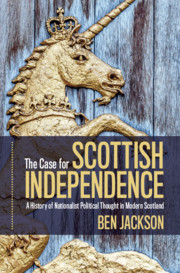Book contents
- The Case for Scottish Independence
- The Case for Scottish Independence
- Copyright page
- Dedication
- Contents
- Acknowledgements
- Abbreviations
- Introduction
- 1 The Ideology of Early Scottish Nationalism
- 2 A Democratic Nation
- 3 Britain in Decline
- 4 The Case for Left-Wing Nationalism
- 5 Sovereignty and Post-Sovereignty
- Conclusion
- Select Bibliography
- Index
2 - A Democratic Nation
Published online by Cambridge University Press: 20 June 2020
- The Case for Scottish Independence
- The Case for Scottish Independence
- Copyright page
- Dedication
- Contents
- Acknowledgements
- Abbreviations
- Introduction
- 1 The Ideology of Early Scottish Nationalism
- 2 A Democratic Nation
- 3 Britain in Decline
- 4 The Case for Left-Wing Nationalism
- 5 Sovereignty and Post-Sovereignty
- Conclusion
- Select Bibliography
- Index
Summary
This chapter examines the cultural case for Scottish independence made from the 1960s onwards, understood in a broad sense as the view that the Union threatens the autonomy of Scotland’s distinctive institutions, particularly its egalitarian character as expressed through its democratic intellectual and educational traditions. The chapter focuses on the influential argument along these lines articulated by the philosopher George Davie and a number of cultural nationalists influenced by him. Although widely discussed, this cultural nationalism was considered to be a false start by many influential figures in the independence movement. The chapter concludes by reviewing why many leading advocates of independence instead looked to alternative intellectual sources, or translated the cultural case into a political one, to advance their cause.
Keywords
- Type
- Chapter
- Information
- The Case for Scottish IndependenceA History of Nationalist Political Thought in Modern Scotland, pp. 35 - 60Publisher: Cambridge University PressPrint publication year: 2020

